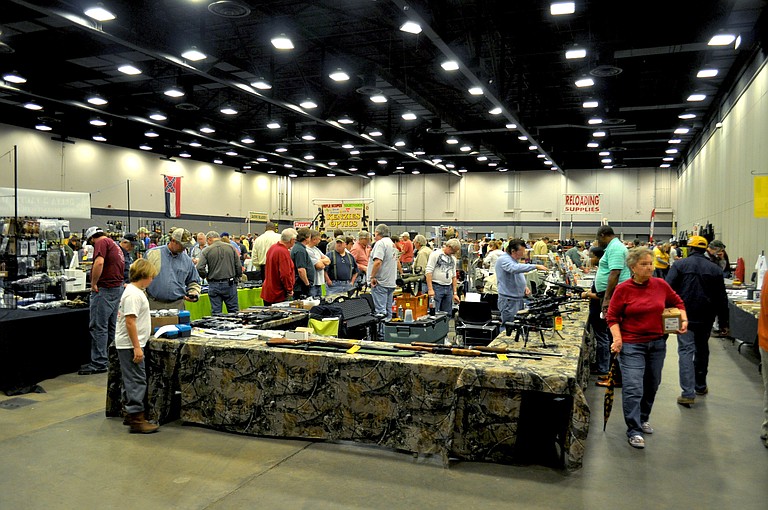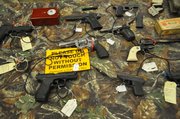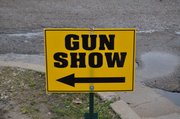A gun vendor displays his wares to Mississippians at the Jackson Gun Show that took place Jan. 12 and 13 at the Trade Mart Building. Organizers estimated that the turnout hit record numbers; some attendees waited in line for hours just to get in. Photo by Trip Burns.
Wednesday, January 16, 2013
Mississippians with a yen to add to their personal arsenals can head out to a gun show in the state just about any weekend of the year. A quick review of the MississippiGunShows.com website Jan. 4 listed 52 shows in 2013, with 11 in Jackson alone--one every month except June.
Gun shows have proliferated in the United States since 1986, when Congress passed the Firearm Owners Protection Act. That law reversed a section in the Gun Control Act of 1968 that prohibited firearms dealers who hold a Federal Firearms License to sell guns anywhere but their registered address. After passage of the FOPA, dealers could take their "stores" on the road.
The so-called "gun-show loophole" takes these shows--which numbered more than 5,000 in 2005--to a whole new level. Under federal law, retailers, manufacturers and others who sell guns as a business must be licensed. Licensed sellers must perform background checks on the people who buy guns from them and keep records of their sales, though records of background checks must be destroyed after 24 hours.
Hobbyists, collectors and others who only make occasional sales are exempt from either performing background checks or keeping records of who buys their guns.
These "private" sellers make up an estimated 25 percent to 50 percent of sellers at gun shows. No background check on purchasers makes it easy for anyone to buy guns, even those who can't pass a check and are legally prohibited from owning firearms, such as convicted felons.
The federal Bureau of Alcohol, Tobacco, Firearms and Explosives' lack of adequate resources to enforce gun laws makes buying guns at gun shows even easier. The ATF monitors, at most, 2 percent of gun shows nationally. The bureau hasn't had a permanent director in six years; the U.S. Senate, which hasn't brought a nomination up for a vote in that time, must confirm nominees for the position. The department's budget has been nearly stagnant for a decade, as has its staffing levels.
A spider's web of laws further hampers the bureau's effectiveness. For example, the agency cannot maintain a database of firearms, making tracing and determination of gun ownership a tedious, manual process when a firearm has been used in a crime.
Between the legal loopholes and lack of regulation and enforcement, gun shows have become sales bonanzas for those who are either unable or unwilling to sell or buy firearms legally. Few states have laws that govern gun shows, and Mississippi isn't one of them. The exhibitor registration form for the Jackson Gun Show, which holds three shows in the Mississippi Trade Mart annually, asks for minimal information, which doesn't include whether the exhibitor is a federally licensed dealer.
Gun shows are the second-leading source of crime guns recovered in firearms trafficking investigations nationwide, behind only corrupt federally licensed dealers, reported the ATF in "Following the Gun: Enforcing Federal Laws Against Firearms Traffickers," published in June 2000. In 2005, Canada's Criminal Intelligence Service called unregulated American gun shows a "serious threat." And a study from the University of Oxford in 2002 estimated that 80 percent of Mexico's illegal firearms are imported from the United States.
The Virginia Center for Public Safety has determined that background checks work to keep firearms out of the hands of criminals. In 2005, licensed dealers doing back-ground checks prevented 2,668 illegal gun sales. The Virginia Tech Review Panel recommended closing the so-called "gun-show loophole" to its state legislature.
"Gun shows provide a large mar-ket where crimi-nals can shop for firearms anonymously. Unlicensed sellers have no way of knowing whether they are selling to a violent felon or someone who intends to illegally traffic guns on the streets to juveniles or gangs. Further, unscrupulous gun dealers can use these free-flowing markets to hide their off-the-book sales," wrote the authors in "Gun Shows: Brady Checks and Crime Gun Traces" in 1999. The report was a joint effort of the U.S. departments of the Treasury and Justice in cooperation with the ATF.
"While most gun-show sellers are honest and law-abiding, it only takes a few to transfer large numbers of firearms into dangerous hands," the report concluded.



Comments
lpdb185 11 years, 3 months ago
This "gun-show loophole" you mention has pretty much nothing to do with gun shows; it has nothing to do with "hobbyists" or "collectors." Simply put, one individual, who is not in the business of selling firearms, may sell his personal property (a gun) to another individual. It can happen at a gun show, a grocery store, or even in the parking lot of your local police station. It is in no way limited to gun shows, and it is not a loophole. A loophole would imply that those subject to the law have some means of avoiding that law. But individual sales are not subject to these laws. Therefore, there is no loophole; the law operates as intended. Analogously, it is no different than selling your car to another individual. Those in the business of selling automobiles must comply with state regulations. Yet there is nothing to stop you, as an individual, from selling your car to me. And to carry the analogy a little further, consider automobile-related fatalities, which account for more deaths per year than firearms. The logic of your article, considering the cited statistic that "[g]un shows are the second-leading source of crime guns[,]" is the equivalent of saying that used car dealers are the second-leading supplier of death-causing vehicles. It is merely sensation. When people die in car wrecks, do we ban or restrict the purchase of sports cars because the might allow someone to drive too fast? Do we crack down on alcohol sales because someone might drink and drive? No, because that would be ridiculous. What we do is focus on deterring those individuals who would abuse their rights and privileges. Why should this logic not apply to firearms?
tstauffer 11 years, 3 months ago
@lpdb185 You would concede, wouldn't you, that gun shows are events designed almost exclusively to sell guns, right? And there are vendors, correct? Who sell guns?
Whereas grocery store and police station parking lots have other, more primary uses, the purpose of the gun show seems pretty straightforward. So it might still make sense to start with the gun shows, since they're a place where a fair bit of gun selling is goin' on.
Automobiles, incidentally, also have other primary uses. While they do frequently kill people, that's not what they're designed and manufactured to do, and they're subjected to a dizzying array of regulation intended to keep them from killing as many people as possible. So I'm not sure your metaphor holds up.
Guns, again, are designed to kill things -- and certain types of guns, bullets and attachments are designed specifically to kill people -- it's not a side-effect of their use for some other task like transportation, food preparation or tree cutting. So it only follows that their manufacture and sale should be "well-regulated," no?
Your comment does do a service -- it points out a loophole in worrying only about gun shows. The solution it suggests to me that not only should we facilitate background checks at gun shows, but perhaps require that private sales of guns go through a licensing process -- a solution exists in your own metaphor -- the sale of a car requires a transfer of title and licensing of the car by the new owner. Maybe it's time gun owners walk their guns down to the county courthouse for a transfer of ownership that includes a background check?
robbier 11 years, 3 months ago
And since you have to get a background check/fingerprinting done when you apply for your conceal carry permit, I'm glad, Todd, that you implicitly would support the private sale of a firearm from one CCW holder to another without the need for further government intervention, seeing as they have already been through the rigorous registration process laid out. Right? So, in theory, you may have just encouraged more law abiding citizens to apply for conceal carry licenses to further ease the purchase and sale of firearms on the secondary market.
Yay for new state revenue streams!
tstauffer 11 years, 3 months ago
Robbie: Actually that sounds pretty good to me. A nice way to compromise. Sort of a "fast pass," although I think the sale/re-sale of any weapon designed with the primary function of killing humans should also go through a "title change"-like process.
And since we agree that CCW permitting is a useful process and might have the side benefit of streamlining regulation in the sales of guns, would there be an objection to permitting (perhaps well-regulated training, licensing, etc., as with cars) for any and all gun ownership?
valentinophoto 10 years, 1 month ago
The loophole is caused by federal regulations. 1. BATF will not do background checks for private sellers, only for licensed dealers. Private parties cannot get background checks even if they wanted them. 2. BATF can take up to three days to approve or deny a firearm transaction. Parties at gun shows often travel great distances and approvals must be made within minutes, not days. BATF tries but I have had them take the full 3 days without either approving or denying my purchase. After 3 days, without BATF response, the dealer may and, in my case did, deliver the firearm.
Incidentally, I have a concealed carry permit issued by the State of Wisconsin and served on the NRA Board of Directors and Illinois State Police Board but, apparently, BATF does not know me.
Sign in to comment
Or login with:
OpenID